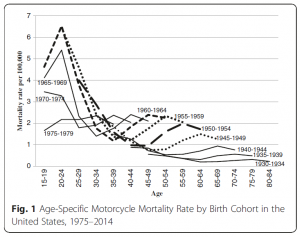
Motorcycle crashes by birth cohort
In a recent paper in the journal Injury Epidemiology Keyes and colleagues applied age-period-cohort analyses to data on fatal motorcycle crashes in the Fatality Analysis Reporting System data and found that baby-boomers have experienced significantly higher mortality from motorcycle crashes than other birth cohorts.
In Current Epidemiology Reports, Fink and colleagues discuss how systems science approaches have made substantive and methodological contributions to the study of population health from a social epidemiology perspective. They argue that combining a focus on social determinants of health with a conceptual framework for understanding how genetics, biology, behavior, psychology, society, and environment interact, a systems science approach can inform our understanding of the underlying causes of the unequal distribution of health across generations and populations, and can help us identify promising approaches to reduce such inequalities.
In a recent American Journal of Public Health article Susser and colleagues report on work-related depression in primary care teams in Brazil. They find that depressive symptoms or probable major depression were associated with longer duration of employment in primary care; being a community health worker; having a passive, active, or high-strain job; lack of supervisor feedback regarding performance; and low social support from colleagues and supervisors.
Bates and colleagues have constructed qualitative case studies exploring factors and social processes underlying relationships between empowerment and intimate partner violence in four villages in Bangladesh. In a recent article in the journal Violence Against Women they report that empowerment may be protective against intimate partner violence in the aggregate, but this relationship can be subverted at the micro level. The argue that interventions are needed to reinforce the potential of empowerment to reduce intimate partner violence and counteract factors such as geographic isolation and limited employment opportunities that inhibit empowerment.

